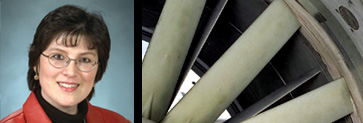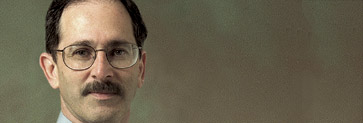
After being a project manager of the Human Research Facility for six years, what brought you to Headquarters?
About the Author
I was invited. The former Bioastronautics Flight Program Manager had been promoted and wanted to go off to his new job. He didn’t have anyone selected to take his place. So, they asked me if I would fill the job for a year, and the opportunity coincided with a natural time for me to make a change. The Experiment Utilization Program I was managing was underway and stable, and it was a good time to step aside and let it be managed by somebody else.
On top of that, it was something my family was enthusiastic about. I have two eleven-year-old sons, who are probably as “portable” right now as they’re ever going to be. My wife also works for NASA. We could arrange for her to come up here and work for a year, and then go back to her job. We looked at it and said, “Here’s an opportunity. We can act on it if we want to.” And so we did.
Do people typically come straight from the field to the job you’re in now? Or were you an anomaly bringing the sort of field experience you had brought to the job?
I think that my assignment was unusual because a permanent person usually fills this position. They would normally be here for years and years and years. It’s unusual that someone comes in and does this particular job for one year simply because it requires continuity. I was a stopgap fix; when I leave, they’ll be looking for a permanent replacement.
What is exciting about the work you’re doing now?
Actually, there’s a good bit that’s exciting. As with any new job, and particularly one that requires a different perspective, there’s always the novelty of simply figuring out the elements you weren’t previously familiar with. There’s an international element to this job that has been particularly interesting for me.
Another thing, of course, is the nature of the environment here at Headquarters. You can’t really learn this being at a Center. I would have guessed that there was a lot more external political pressure — answering inquiries from Congress and so on — here at Headquarters. I expected that pressure to create something of a “reaction” environment here. As it turns out, politics play a role here, but it’s less than I thought it would be.
That was a nice surprise, as I take it.
Yes, it was. I was pleasantly surprised to learn that there’s still plenty of room for people to set out a program management objective and not be interfered with. In other words, you can set a goal and achieve it.
How much did you know about the assignment before you got here?
I had a pretty good idea of what the job would be like. The person I’ve replaced is the same person who I was interfacing with while I was still at the Center. Having worked directly with him, I had some idea without actually having done the job what the job was about. We worked problems together, with me as the Center-level person and him as the Headquarters-level person, for five or six years now.
What would be the benefits to someone like you, a successful project or program manager at a Center, spending time at Headquarters?
You know that the Agency is putting a lot more emphasis on rotations or jobs other than at your home Center as a requirement for promotion. There is an emphasis on that, and I think for good reason. However, in my case, I wasn’t really looking for a promotion.
It does broaden your perspective. If you’re going to continue to work at the Center with Headquarters interfaces, especially direct interfaces, there can’t be any better experience than to have looked at issues through their eyes.
Someone might look at your situation and say these circumstances were unique. What would you say to somebody who wouldn’t necessarily see a Headquarters rotation as an important career step?
I’m going to return this to you as a question. Would you agree with me that some of the better program and project managers are always trying to find the broadest perspective on their program that they can? What is their Headquarters organization expecting? What is their Center expecting?

The International Space Station (ISS) moves away from the Shuttle Discovery after a crew exchange on the STS-102 mission, March 2001.
I think the best program and project managers are always trying to take the point of view of their customers. Hardly any of them are just focused on getting their job done.
Is there a stage in one’s career where you’re ready for this kind of assignment? When you can bring back what you learn here in the most useful way?
Somewhere in that project manager-program manager zone, I would say, would be the natural time to do that. I would say that you need to have gone through that experience at the Center before you go off and try to look at that job from a Headquarters perspective.
Let’s turn things around. What do you think is the most important thing Headquarters can learn from the project manager or program manager who comes here on rotation?
At the project level, you’re clearly focused on how to solve the problem of implementation. The Centers have the people on the ground. They’re doing the work. They have the problems.
Up here at Headquarters, you own the top-level requirements, in terms of being able to change them or negotiate them with a project. A lot of what they do depends on the information they get from the implementing Center. The more you understand what the work is and how it gets done if you’re at Headquarters, the better both of you can take a question and translate it into a discrete request for information and target it at the right person.
As a matter of fact, this comes up every month when we do status reports. If someone here at Headquarters sends down a “fuzzy” question that’s not appropriately directed, it causes unnecessary work. Because I have a good understanding of the work that’s being done in the field and who’s doing it, I send down specific questions and I try to direct them to the right person. In a way, I pre-work any problem I detect by narrowing the focus of my question and by proposing alternative solutions to the problem. It reduces the amount of work required by the project team.
After this rotation, when you return to your Center, how do you think you will be more effective as a manager?
When I go back to the Center, my interfaces at Headquarters will be these same people with whom I have worked for a year. So, for one, I will have a much better feel for personalities and how to work problems. You know whom you can talk to and what they know or how they are likely to react. All of those things help you be more effective in supporting them when you go back to the Center. Having seen it from their perspective is a benefit.
That sounds like valuable information; I’m curious about the way that you’ll share it with other people at your Center.
There are expectations at the highest levels that flow through the associate administrators into this office. I know how it works. I’ll take that knowledge back with me.
In addition, since I’m working now to revise programmatic processes and I’m part of making those new designs and decisions, I understand the changes in a way I never could have had I not been part of this. I expect that I’ll be the person that gets to communicate these new processes.
As your yearlong assignment winds down, do you have advice for other project managers who might be considering a Headquarters assignment?
Just that I would encourage people who are at the right point in their careers to take these temporary assignments.
The Agency wants to see it happen, and it’s of benefit to the individuals concerned. The idea of moving to Headquarters for a year was never on my radar before I fell into the opportunity; but for anyone in a transitional period of project work, or someone looking to advance their careers, it’s something they should seriously consider.
For my entire family, it’s been a wonderful educational experience living here in Washington. It’s a good place to be for a year, because there’s plenty to see and do. I’m guessing that, in the future, all of us will mark time by the year we spent here. I know that I will.
Search by lesson to find more on:
- Professional Growth
Read more about the Space Station:
Smart Buying








